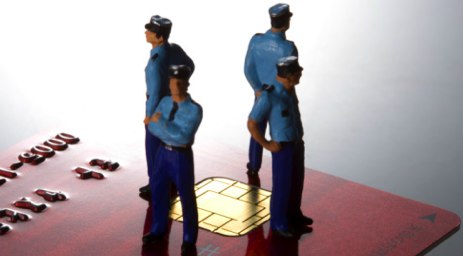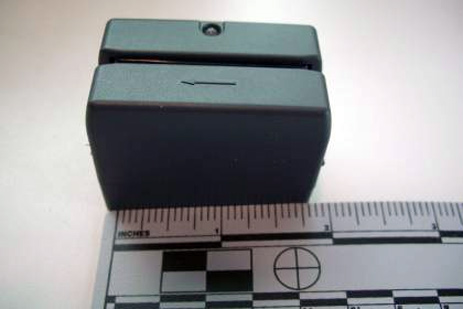Jeremy Clarkson, a British TV star, wrote an editorial describing privacy activism as “palaver,” and just to prove how safe we all are, included his bank account number. Soon afterwards someone snagged £500 from the Top Gear host’s account. “I was wrong and I have been punished for my mistake,” the presenter later told reporters. Needless to say, you should never share your bank account information with anyone who doesn’t need it, for instance, millions of faceless readers.
identity theft

TV Star Includes Bank Account In Editorial Saying Identity Theft Is No Big Deal, Gets Defrauded

Geeks.com Website Hacked, Customer Data Stolen
If you bought anything from Geeks.com in at least the last year or so, you might want to start paying close attention to your credit card statements—the company sent out an email on Friday telling former customers that they “recently discovered on December 5, 2007 that customer information, including Visa credit card information, may have been compromised.” Full email after the jump.
../../../..//2008/01/04/if-youre-serious-about/
If you’re serious about keeping your personal information safe, then make sure you wipe your computer’s hard drive with something like Eraser or Darik’s Boot and Nuke (DBAN) (both free) before handing it off to a friend, family member, or random stranger.

California's Consumer Data Law Isn't Working Too Well
The “Shine the Light” law passed in California in 2005 requires all businesses to tell customers who they sell their private data to, and to provide a no-cost way to remove your name, address, and phone number from their lists. Unfortunately, it’s not being followed by more than half of the companies tested in a new report: “The California Public Interest Research Group found only one third of the survey participants received responses from companies consistent with the law.”

Friendly Gap Cashier Pockets Lost Wallet
Alenaya traced her lost wallet to a recently visited Gap and pieced together a disturbing story:
Seemingly, walked away from register and wallet fell out of pocket. Kind customer behind me gives to cashier, who sticks it on the side of the register and does not log or tell manager my wallet fell.
How Pretexters Steal Your Private Information
Al Schweitzer, a former pretexter, described before Congress the underlying principle of how, for fun and profit, he was able to trick various agencies and institutions into giving up other people’s confidential and personal information.
Identify the piece of information you are after; identify who or what institution is the custodian of the information sought; based on real world situations or actual operational procedures of the target institution, figure out under what circumstances and to whom the desired information would be released; be that person under those circumstances.
Emphasis added. Using this method Al was able to get people’s phone records, bank statements, and tax returns for his clients, who were often insurance companies, lawyers, and law enforcement. He successfully pretexted the IRS and the Social Security Administration. Simply put, if someone with money wants it, your personal information is not secure.

Stores Can't Force You To Show ID With Your Credit Card
Here’s an interesting fact in this Red Tape Chronicles post about how to protect your private data bits from retailers who don’t know any better: by the terms of their merchant agreement with credit card issuers, stores are not allowed to force you to present ID in addition to your credit card.

FTC Says Identity Theft Has Dropped, Sort Of, Maybe Not?
The FTC’s figure for identity theft in 2005 was 8.3 million Americans over the age of 18, a drop of about 16% from the 9.9 million it measured in 2003. (2005 is the most recent year for which they have data.) However, not only are consumer groups saying that these numbers are faulty, even the FTC admits in a footnote that “its conclusion is not ‘statistically significant’ because the sample size was too small.”

Shop Online Safely With Temporary Credit Cards
Almost every time we write about fraud or identity theft, savvy readers will point out in the comments that many card companies offer temporary credit cards—virtual accounts tied to your real one that expire after one use, or a few days, or after a certain spending limit is reached. We thought it might be a good time to remind readers about these services, as well as password-protected and so-called “anonymous” credit cards.

TJX Proposes One-Day Sale As Part Of Class Action Settlement
When TJX revealed earlier this year that they’d failed to keep safe over 45 million customer credit card accounts, they were hit with both consumer and bank class action lawsuits. Now they’ve submitted a proposed settlement for the consumer class action suit that includes a strange, somewhat insulting offer: a “one-day sale” for victims of the theft. Attorneys general from eight states have filed an objection against the proposal, citing that even if it’s a well-intentioned goodwill gesture, it doesn’t belong as part of any official, legal settlement, which should be designed to benefit the victims rather than the retailer.
../../../..//2007/11/19/considering-googles-penchant-for-automated/
Considering Google’s penchant for automated emails and redirects to Help files when things go wrong, what would you do if someone hacked your Gmail account and had access to all your emails, Google documents, etc etc? [Google Blogoscoped]

Finding Legal Lucre In Identity Theft
A slate of companies legitimately profit from identity theft by offering services that the three credit reporting agencies refuse to make easily accessible to consumers. The Times brings us the stories of three such companies that are sucking the venture capital teat all the way to market:

Lots Of Retailers Don't Use Proper Wireless Security
The recently reported TJ Maxx security breach—where data on 94 million credit card accounts was stolen in 2003, 2004, and 2006—has ended up costing the company $200 million and counting. But although it’s the biggest example so far of retail data theft, TJ Maxx isn’t the only retailer doing a poor job of keeping sensitive data protected from hackers. One wireless security vendor recently surveyed thousands of stores and discovered that a significant number of retailers don’t practice good wireless security:

That $3000 Was Fraud? Chase Doesn't Care, It Only Wants Money
Brandon writes:“In January 2007, I was traveling in Mexico and was mugged, having my wallet and passport stolen. By the time I got back to the hotel and began calling my credit card companies to cancel, the criminal had charged close to $3,000 on my CHASE Circuit City Visa card. I explained to CHASE that the charges were fraud, and they sent me a fraudulent charge affidavit to complete and have notarized. As I couldn’t take care of this until I returned from my trip, and had more important things like a passport to worry about, I waited a few weeks before completing the paperwork and during those weeks received about 2 calls a day from CHASE urging me to send the documents.”

How To Freeze Your Credit Report
Red Tape Chronicles has a good guide for how to set up a credit report freeze at each of the three major credit bureaus.

Safeway DVD Kiosk Comes With Credit Card Skimming Device
Crafty identity thieves attached a credit card skimming device to a DVD kiosk at a Colorado Safeway. The 2-inch skimming device was discovered only after a customer asked a Safeway employee for help after his card wouldn’t scan.


